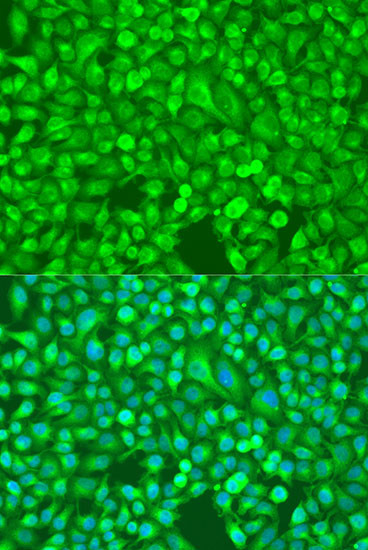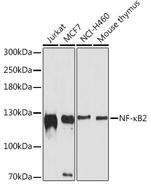Search Thermo Fisher Scientific
Product Details
PA5-88086
Species Reactivity
Host/Isotype
Class
Type
Immunogen
Conjugate
Form
Concentration
Purification
Storage buffer
Contains
Storage conditions
Shipping conditions
RRID
Product Specific Information
Immunogen sequence: AGADIHAENE EPLCPLPSPP TSDSDSDSEG PEKDTRSSFR GHTPLDLTCS TKVKTLLLNA AQNTMEPPLT PPSPAGPGLS LGDTALQNLE QLLDGPEAQG SWAELAERLG LRSLVDTYRQ TTSPSGSLLR SYELAGGDLA GLLEALSDMG LEEGVRLLRG PETRDKLPST EVKEDSAYGS QSVEQEAEKL GPPPEPPGGL CHGHPQPQVH; Positive Samples: Jurkat, MCF7, NCI-H460, Mouse thymus; Cellular Location: Cytoplasm, Nucleus
Target Information
The NFkB transcription factor was originally identified as a protein complex consisting of a DNA binding subunit and an associated protein. The subunit is functionally related to c-Rel p75 and Rel B p68. The p50 subunit was initially believed to be a functionally unique protein derived from the amino-terminus of a precursor designated p105. A cDNA has been isolated that encodes an alternative DNA binding subunit of NFkB. It is synthesized as a protein that is expressed in a variety of cell types and, like p105, undergoes cleavage to generate its NFkB subunit, in this case a protein designated p52 (previously referred to as p49). In contrast to p50 derived from p105, p52 acts in synergy with p65 to stimulate the HIV enhancer in transiently transfected Jurkat cells.
For Research Use Only. Not for use in diagnostic procedures. Not for resale without express authorization.
References (0)
Bioinformatics
Protein Aliases: DNA-binding factor KBF2; H2TF1; Lymphocyte translocation chromosome 10 protein; Lyt10; NF kappaB2; NF KB; NFKB, p52/p100 subunit; nuclear factor; nuclear factor kappa b; nuclear factor Kappa-B, subunit 2; Nuclear factor NF-kappa-B p100 subunit; nuclear factor NF-kappa-B p52 subunit; nuclear factor of Kappa light chain gene enhancer in B cells 2; Nuclear factor of kappa light polypeptide gene enhancer in B-cells 2; nuclear factor of kappa light polypeptide gene enhancer in B-cells 2 (p49/p100); nuclear factor of kappa light polypeptide gene enhancer in B-cells 2, p49/p100; Oncogene Lyt-10; OTTHUMP00000020371; transcription factor NFKB2
Gene Aliases: CVID10; H2TF1; lyt; LYT-10; LYT10; NF-kappaB2; NF-kB2; NFKB2; p100; p49; p49/p100; p50B; p52
UniProt ID: (Human) Q00653, (Mouse) Q9WTK5
Entrez Gene ID: (Human) 4791, (Mouse) 18034

Performance Guarantee
If an Invitrogen™ antibody doesn't perform as described on our website or datasheet,we'll replace the product at no cost to you, or provide you with a credit for a future purchase.*
Learn more
We're here to help
Get expert recommendations for common problems or connect directly with an on staff expert for technical assistance related to applications, equipment and general product use.
Contact tech support


